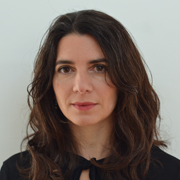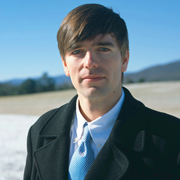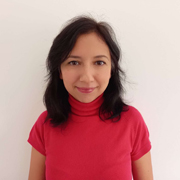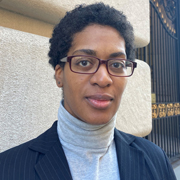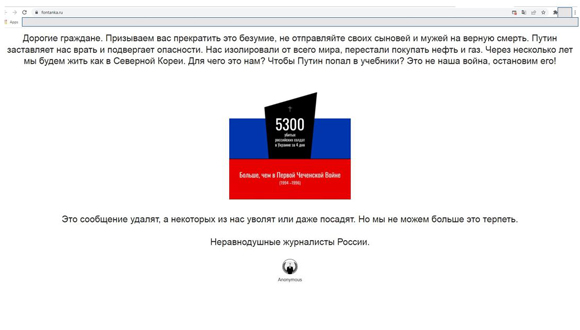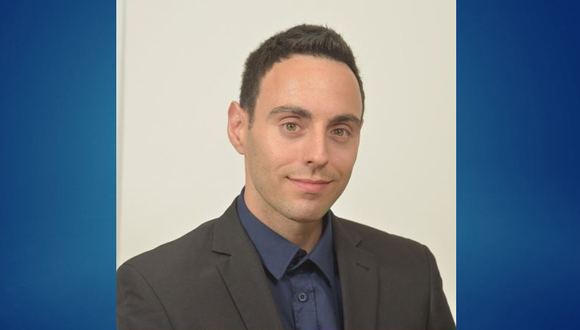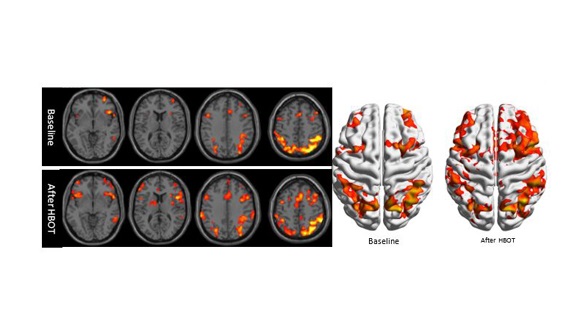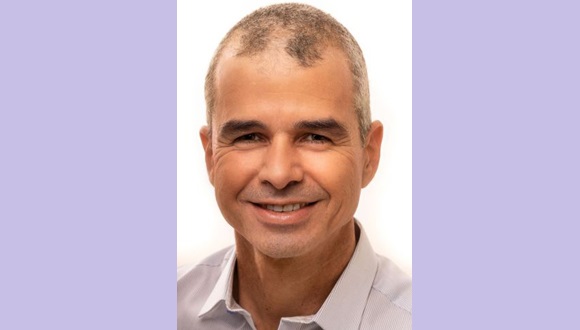A software programmer, an ecologist and a wildlife photographer enter a room. This is not the preamble to a joke. This is a normal scene in Dr. Ofir Levy’s Tel Aviv University lab, where a diverse group of scientists develop advanced tools to protect wildlife in the face of the accelerating climate crisis.
Levy is among the scores of TAU researchers who are pursuing innovative solutions under TAU’s Climate Crisis Initiative, also known as PlanNet Zero, a new nerve center uniting brainpower from all faculties—along with industry and government partners. Leveraging TAU’s interdisciplinary and entrepreneurial strengths, the Initiative aims to spearhead new technologies, models, regulations and policy recommendations for tackling the climate crisis.
“Climate records are being shattered nearly every year,” explains Levy of the School of Zoology, Wise Faculty of Life Sciences. “It is up to us to safeguard the biodiversity critical to the planet’s ecological balance.”
Together with researchers from TAU’s new Center for Artificial Intelligence and Data Science, Levy’s lab develops AI and machine learning technologies to simulate future ecosystems. Using these models, the decision-makers with effective recommendation for protecting them.
“AI is taking climate research to new frontiers,” explains Levy. “It offers a window into the future implications of climate change on the need for animals to modify their habitats because of desertification, urbanization and deforestation.”
Additionally, in cooperation with the Israeli Defense Ministry’s Directorate of Defense Research and Development, Levy is developing tools to assess the impact of climate change impact on search and rescue dogs. More frequent extreme weather phenomena may affect the sensory abilities and overall wellbeing of the dogs, he explains. His research could eventually help improve the animals’ ability to find and save people.
Levy recently won competitive grants from National Geographic’s “AI for Earth” and the joint TAU-Google “AI for Social Good” programs.
Going forward, he hopes to apply his innovations to protecting people, such as early-warning systems for mass health events such as heat stroke or forecasting climate-related insect migration to prevent crop disease.
Mobilizing TAU’s Collective Power
Amid the growing global need to meet climate targets, TAU is redoubling efforts to lead transformative change and has made the topic an institutional priority.
“It’s now the era for scientists and academia to help find solutions to the climate situation,” says
Prof. Colin Price, who heads PlanNet Zero together with the Department of Environmental Studies at TAU’s Porter School of the Environment and Earth Sciences.
Among institutional efforts, TAU rolled out plans to reduce its environmental footprint and eventually reach carbon-neutrality, a benchmark Israel and other nations pledged to meet by 2050 to mitigate global warming.
Furthermore, the University launched several new programs to foster climate leadership. The new undergraduate course “Climate Change and Sustainability: A Multidisciplinary View” was the most popular of the 2020-21 academic year, with some 1,000 students enrolled. At a climate conference hosted by the Gordon Faculty of Social Sciences, Israel’s Minister of Environmental Protection and TAU alumna Tamar Zandberg announced a new government-backed scholarship program to support climate research by graduate students at the Faculty.
Moreover, in an effort to disentangle the climate crisis for the public, the Steinhardt Museum of Natural History at TAU unveiled the exhibition “Global Warning: The Climate, the Crisis and Us.”
“Climate change is the greatest challenge facing humanity today,” says Prof. Tamar Dayan, Chair of the Steinhardt Museum. “Alongside the exhibition, we aspire to turn our visitors into agents for change, who will carry the message beyond the Museum’s walls.”
Redesigning Trends in Sustainability
To push the needle on the global climate crisis, PhD candidate Meital Peleg Mizrachi, of TAU’s Department of Public Policy, is advocating for a fashion industry makeover.
Peleg Mizrachi, an environmental justice researcher at TAU and social entrepreneur, is a rising authority in Israel on making fashion—the world’s second-most polluting industry—sustainable.
.jpg)
Meital Peleg Mizrahi (center) and friends modeling sustainable fashion
The process of manufacturing clothing emits over 40 billion tons of textile waste and 1.2 billion tons, or 10 percent, of greenhouse gases—the main driver of global warming. At the root of the industry’s environmental footprint, Peleg Mizrahi explains, is the exploding “fast fashion” market of quickly and cheaply mass-produced garments.
Under the supervision of Knesset Member and TAU Prof. Alon Tal, Peleg Mizrachi’s research explores ways to encourage economic regulation and consumer behavior that promote sustainable fashion. Tal is one of several TAU climate experts in prominent government roles, including zoology Prof. Noga Kronfeld-Schor, Chief Scientist at Israel’s Environmental Protection Ministry.
In a recent project, Peleg Mizrachi gauged the prices at which consumers are more inclined to shop sustainably. In other studies, she demonstrated how new technologies and market behaviors spurred by COVID-19 can be transformed into climate solutions.
She also applies her research toward grassroots advocacy. She was recently involved in a series of local climate policy conferences and founded ‘Dress Well,’ an organization that seeks to reduce textile waste in Israel.
״When we think of the climate crisis, we think of Australian wildfires, vanishing polar bears and droughts in Syria,” she says. “The connection between these events and the clothes in our closets are usually overlooked; in fact, fashion is one of the most significant factors in dealing with the climate crisis.”
TAU: Hub for Regional Cooperation
TAU’s location in the heart of the Middle East with proximity to Israel’s diverse ecosystems contributes to its edge in leading regional climate initiatives.
For example, to address trans-border water issues in the Middle East, TAU Prof. Hadas Mamane of the Fleischman Faculty of Engineering is eyeing cooperation opportunities with regional partners.
As floods, droughts and extreme weather intensify due to climate change, UNICEF estimates that by 2025, half of the world’s population will live in areas with water scarcity. Meanwhile, Israel’s chronic water shortage has necessitated the development of novel solutions.
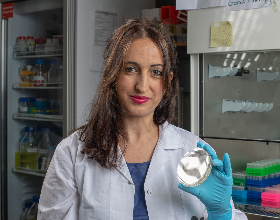
Prof. Hadas Mamane
Mamane heads the Water-Energy Laboratory, which develops efficient UV-LED lighting technologies that disinfect water using solar power, among its pursuits. The invention is suitable for use in remote areas with limited access to the chemicals and electricity used in traditional water decontamination.
Additionally, water monitoring tools developed by her lab are already used in India and Tanzania in several projects carried out with Dr. Ram Fishman of the Gordon Faculty of Social Sciences and Boris Mints Institute for Strategic Policy Solutions to Global Challenges.
“We are trying to help some of the world’s most vulnerable populations access resources that should be afforded to them as part of their basic human rights,” says Mamane.
Now, Mamane hopes to launch a project with the Palestinian Authority and the Arava Institute for Environmental Studies to purify and disinfect sewage water for unrestricted agricultural use, including crop cultivation.
In another regional partnership borne through the Abraham Accords, TAU’s Moshe Mirilashvili Institute for Applied Water Studies, headed by Prof. Dror Avisar of the Porter School of the Environment and Earth Sciences, is involved in joint Israeli-UAE water research.
Enhancing Cross-Industry Impact
“The fastest way to make an impact on climate change is to apply academic knowledge toward accelerating relevant industry capabilities,” says Prof. Tamir Tuller of the Fleischman Faculty of Engineering and the Edmond J. Safra Center for Bioinformatics.
This is the approach that Tuller, head of TAU’s Computational Systems and Synthetic Biology Laboratory, takes with his start-up Imagindairy where he is co-founder and Chief Scientific Officer. The company uses his genetic engineering techniques to produce affordable dairy products from yeast.
Imagindairy aims to generate milk that is identical in taste, aroma and texture to cow products, Tuller explains, but without the environmental damage or ethical dilemmas associated with animal husbandry.
Cattle alone are responsible for approximately 65 percent of the livestock sector’s greenhouse gas emissions, mainly from methane that cows belch out while feeding.
“This type of technology could one day replace the need for dairy cows,” he says. He adds that widespread adoption of lab-developed milk substitutes has the potential to significantly curb emissions. But how will Tuller’s team get the public on board?
“Our models can eventually lead to products that are cheaper than traditional cow’s milk,” explains Tuller, underlining that economic incentive is key to impactful consumer behavior.
He expects Imagindairy’s products to be commercially viable within a few years. This quest was boosted with a recent $13 million investment, raised with support from Ramot – TAU’s technology transfer company.
Solid Foundations for Leadership
Dozens of TAU alumni have taken leadership roles that address climate issues on the international stage. Two of them, Dr. Ido Sella and the late Dr. Shimrit Perkol-Finkel, who was tragically killed in an accident last year, met as students at TAU.
In 2012, the pair founded sustainable concrete start-up, ECOncrete, which offers a more durable and ecological solution for coastal and marine construction than traditional concrete. The product simultaneously reduces carbon emissions and safeguards marine life. Today, the company is experiencing massive growth, and its eco-friendly solutions are used in more than 40 sites around the world. Similarly, its technology was recently tapped to anchor US offshore wind turbines as part of the White House administration’s aims to increase energy capacity a thousand-fold by 2030.
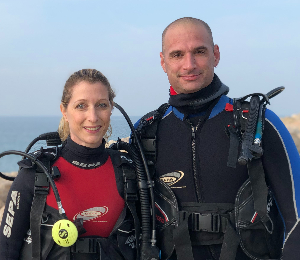
The late Dr. Shimrit Perkol-Finkel (left) and Dr. Ido Sella
“The concrete industry has a massive environmental footprint responsible for 8% of global carbon dioxide emissions and vast marine damage,” says Sella.
He explains that the demand for sustainable concrete has reached new heights as society—particularly the approximately 50% of population centers on coastlines—braces for a rise in sea levels and increased storminess due to climate change.
“ECOncrete offers a new way to reduce the CO2 footprint of working waterfronts,” he says.
Sella sees oceans of potential for bringing more applied science to commercial endeavors via academia, thus propelling climate progress.
Prof. Colin Price, too, underlines the need for all industries and sectors to work with academia to prevent catastrophic climate outcomes.
“We have big ambitions at TAU,” Price says. “We aim to have maximum impact and expand local models to regional and global scales.”
| Climate Research at TAU: |
|
TAU researchers from across campus are finding ways to mitigate climate change, among them:
- Prof. Brian Rosen (Engineering) patented a technology that consumes greenhouse gases as a means to generate “clean” synthetic fuels.
- PhD candidate Hofit Shachar (Exact Sciences) is developing an app that predicts the risk of wildfires through smartphone sensors and weather data.
- Dr. Eran Tzin (Law) applies his research as head of TAU’s Environmental Justice and Animal Rights Clinic to advance legislation to ensure implementation of Israel’s climate commitments.
- Prof. Colin Price (Exact Sciences) is building a nanosatellite to monitor global climate conditions from space. Dr. Ram Fishman (Social Sciences) discovered a link between violent crime and rising temperatures.
- Sophia Igdalov, of Dr. Vered Blass’s team (Exact Sciences), evaluated the carbon footprint of materials used in Israel’s housing industry, suggesting strategies to cut emissions.
|
Tackling Environmental Challenges—in TLV and Monaco
As part of TAU’s practical work in mitigating the effects of air pollution and climate change, the Frenkel Initiative to Combat Pollution supports projects between TAU, Israeli companies and Monaco. Current initiatives include operating an accelerator for startups in clean energy, air purification and replacing plastic; introducing smart transportation solutions to Monaco officials for reducing carbon emissions; and researching critical problems specific to Monaco such as urban heat stress and maritime transport emissions.

Monaco Bay
Although the Initiative attempts to find technological solutions specifically for Monaco, TAU Benefactor and Governor Aaron Frenkel hopes it can make an outsized contribution toward combating climate change and related environmental threats for the entire Mediterranean region and beyond. The Frenkel Initiative is also affiliated with the Prince Albert II of Monaco Foundation, which is dedicated to safeguarding the environment.
By Julie Steigerwald-Levi






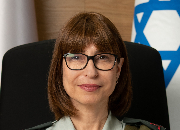
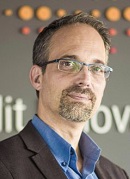
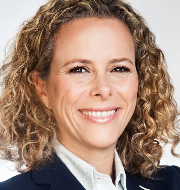


.jpg)





